
ECAP Child Safety Standards Expert Panel, Caring Well Conference, DFW (Oct. 2019)
The Evangelical Council for Abuse Prevention (ECAP) began because evangelical ministries have a problem. The Houston Chronicle’s 2019 Abuse of Faith series demonstrated that hundreds of victims suffered abuse at the hands of ministry leaders and volunteers with insufficient response from the ministry leadership. Around this time, hundreds more stories revealed the massive problem of abuse in our country, even in well-known organizations like the Boy Scouts of America and USA Gymnastics. Many adults serving in these organizations were not able to recognize indicators of abuse or characteristics of abusers, and did not know how to respond rightly to suspected abuse.
Followers of Jesus believe that abuse is an affront to God because every human being is made in his image. Scripture tells us that God is an advocate for the vulnerable, instructing us, “Do not exploit the poor because they are poor and do not crush the needy in court, for the LORD will take up their case and will exact life for life” (Proverbs 22:22-23). Abuse of any sort, whether financial, spiritual, physical, sexual, or emotional grieves God’s heart and ought to grieve those who follow him.
Prior to Abuse of Faith, several Christians had already sought to give guidance to the church on matters related to child safety in ministry. Deepak Reju’s On Guard: Preventing and Responding to Child Abuse at Church began a conversation among evangelicals about the responsibility that ministry leaders have to care for the safety of their children. Plenty of other leaders also sought to equip the church in this area, such as Victor Vieth, Richard Hammar with Christianity Today, Theresa Sidebotham, Rick Braschler, Justin Holcomb, and several folks involved with GRACE. They were all leading the way in helping ministry leaders protect children and care for abuse survivors in churches. However, two problems still remained: How do we connect ministry leaders with child safety and abuse prevention best practices? And how do ministry leaders ensure that child protection measures are maintained over the course of time?
Jeff Dalrymple became aware of these two problems while serving as a Vice President at the Southern Baptist Theological Seminary in Louisville, KY. While there, he was tasked with developing child protection measures for all the children’s programming at the seminary. Later on, he was brought onto the team at Crossings Camp to ensure the kids there were protected as well. These experiences helped Jeff to see the risk involved in running these ministries for kids, and made him realize that more needed to be done to ensure the safety of children in ministry. Based on his own experience and input from other pastors and ministry leaders, he began to dream up the idea that became ECAP.
After speaking to subject matter experts, Jeff realized that the evangelical community has a real trust and accountability problem, and that the only way for child safety practices to be sustained over time would be through some kind of independent verification model. Organizations like ECFA and ACSI demonstrated that industry standards could be developed, and independent verification could be done for ministries in the areas of financial transparency and academic standards. What if an organization was created to develop standards for child safety, with an accompanying accreditation program to verify that ministries were complying with those standards? And so, the concept for ECAP was born.
ECAP was first incorporated in July 2019, with board members Jeff Dalrymple, Adam Mersereau, and Dan Dumas. Their first action was to adopt a set of Bylaws and a Statement of Faith, which was adapted from ECFA’s. It was incredibly important to the Board that this new organization was designed uniquely for the evangelical community. Their commitment to child safety was based on their love for God, commitment to His Word, and desire for evangelical churches and ministries to become engaged in this mission. Soon after this, through a connection at ECFA they reached out to Sally Wagenmaker to serve as their legal counsel.
Then they commissioned an Expert Panel to develop a set of Child Safety Standards and best practices for organizations that serve kids. All members of the Expert Panel had to agree to ECAP’s Statement of Faith, and could not be compensated. This panel was chaired by Theresa Sidebotham, and included Jeremy Herron, Dee Dee Mayer, Rick Braschler, Melodie Bissell, Ed Sherrill, Scott Beard, Randy Coffman, and Steve Case, and Garrett Freeman, who was later replaced by Dee Dee Mayer. Two other consultants came on as well, Frank DiLallo and Benton Mobley, both of whom brought expertise related to serving ministries in abuse prevention and child safety. This group first met by Zoom to get to know one another and began to outline the scope and vision of the project. The Expert Panel was chosen to represent stakeholders from all aspects of the issue: children’s ministry, camps, schools, victims’ advocates, organizational leadership, legal defense, insurance, and more.
The Expert Panel and Sally Wagenmaker then met in person during the Caring Well conference hosted by the Ethics and Religious Liberty Commission (ERLC) of the SBC in October 2019. The ERLC kindly hosted the Expert Panel, helping to provide accommodations and meeting space to support this work. Russell Moore and Philip Bethancourt spoke to the Panel and shared thoughts and ideas. Three ministry practitioners also joined this group to help ensure that the Standards were implementable.
Following this in-person meeting at Caring Well, the Expert Panel held about a dozen more meetings over Zoom where they continued to refine the Child Safety Standards. They wrestled to determine which measures were truly necessary for a ministry to implement to provide for child safety. During these meetings, the Panel recognized the need for the “Response” section of the Standards, since so many ministries had not only not protected the children in their care, but they also failed to properly responded once the abuse was uncovered. The final in-person meeting was held in March 2020 at The Oaks Christian School in California, just as COVID-19 reached American shores. Jenna Quinn was invited to speak at a dinner there for the Panel. This was a historic occasion, in that experts in many different fields were able to come together and create common standards for child safety in ministry. This had never previously been accomplished.
Around May of 2020, a Legal Review Team began work on the Standards. This included Sally Wagenmaker, Rob Showers, Alexandra Ableitner, and Cindy Coffee. After legal review, the Standards became public for review and comment. Meanwhile, another group began working together on the accreditation compliance process, which included Pete Bargas, Carol Aversa, Leslie Wise, and Stuart Michelson. This group largely borrowed from the ACSI model of accreditation, ensuring it could translate to the various types of ministries ECAP sought to serve.
In May of 2021, Briggham Winkler came on to the ECAP team to help with communications and resources to serve ministries. His first project was to work on the organization and clarity of the Child Safety Standards alongside Jeff Dalrymple and other experts in child safety and accreditation. This editing process took several months in order to ensure the Standards were as comprehensive and succinct as possible so that ministry leaders could understand and create compliant policies and procedures. Jesse Maynor joined ECAP in January of 2022. With his background in compliance verification for the US Navy, he helped to ensure that each Indicator of the Standards was verifiable and measurable. He then began building out the Accreditation Program.
Three presentation meetings to ECAP’s board took place in 2022 to approve the Child Safety Standards, Accreditation Program, and Compliance Verification Process. ECAP began inviting Charter Members to help refine the Standards and Accreditation Program. ECAP conducted their first audit in June 2022. Throughout the beta testing process, ECAP learned a lot about the support necessary for ministries to successfully become compliant.
At this time, ECAP released their Statement on Organizations with a History of Abuse. In it, ECAP affirmed, “we are devoted to working with Christian ministries who are committed to making the future of their organizations safe for children and youth and abuse-free. It is our desire that, besides finding rest in the promises of the gospel, abuse victims find solace in our mission to end abuse in the context of Christian ministries forever. Because all people are made in the image of God, all people are deserving of a chance to learn who he is in a safe and loving environment. By implementing our Standards, we believe that ministries are putting proper structures in place to make sure that this is possible. Organizations that have had instances of abuse are perhaps the organizations that need our safety Standards the most. Whatever their history, we desire to serve anyone that aspires to make the future of their organization safe for kids.”
ECAP’s Accreditation Program was officially launched on January 9, 2023. Providence-Frisco became the first accredited organization in June 2023, and Deerfoot Lodge became the first camp to be awarded accreditation in September 2023.
As of Spring 2024, ECAP has expanded their network to include church plant memberships, Affiliate providers and networks, and they are promoting an initiative called Safeguards 4 Kids to help equip parents and caregivers to have conversations about abuse prevention. They continue to see the need for additional resources for churches and ministries to implement best practices that are compliant with our Standards. They also see the need for improvement in ministry governance, as leadership support and change management are necessary in order to build out a meaningful and effective Child Protection Program. They want to see ministries impacted around the world, so they have begun the process of translating the Child Safety Standards into Spanish, and want to fund more translation projects of child safety resources. ECAP looks forward to working with even more ministries as they desire to see every evangelical ministry become a safe place for children to hear the gospel and grow in discipleship.





